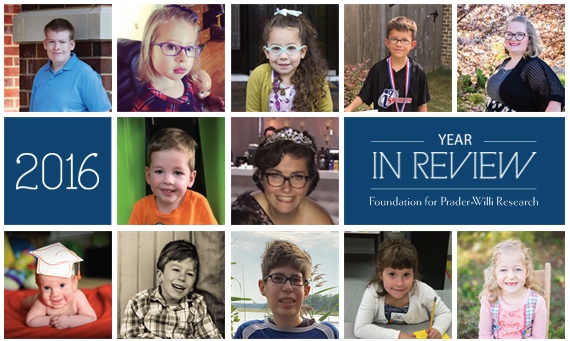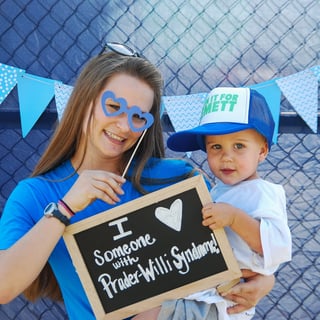
FPWR community, 2016 was yet another remarkable year for Prader-Willi research! Our supporters have allowed FPWR to fund more research than ever before, taking us closer to treatments for our loved ones with Prader-Willi syndrome. Read below for a few research highlights from the year.
- FPWR, with the input of community stakeholders, has developed an ambitious research plan for the next 5 years. The plan, which is estimated to cost $26 M, will accelerate the development of treatments for PWS by generating critical knowledge and building tools to improve the health and well being of those with PWS. Learn more about our research plan.
- FPWR funded researchers, Drs. Burnett and Leibel, have published a breakthrough discovery in the Journal of Clinical Investigation that could change our understanding of PWS and open up new avenues for therapeutic development. Now that we have a possible explanation for the wide array of symptoms, we can move forward with developing a drug that addresses their underlying cause, instead of treating each symptom individually.
- Dr. Yong-hui Jiang has taken a major step towards developing a genetic therapy for PWS, as recently reported in the high profile journal, Nature Medicine. It’s possible that the compounds Dr. Jiang has identified for PWS gene activation could be tested in humans with PWS sometime in the not so distant future.
 The FPWR grant program has developed a broad portfolio of projects, investing over $8M into PWS related research. We have supported more than 100 new advances that have been published in the medical literature and have funded the development of key resources for use across the scientific community. Learn more about our latest round of funded grants or watch this webinar explaining why we are excited about these projects!
The FPWR grant program has developed a broad portfolio of projects, investing over $8M into PWS related research. We have supported more than 100 new advances that have been published in the medical literature and have funded the development of key resources for use across the scientific community. Learn more about our latest round of funded grants or watch this webinar explaining why we are excited about these projects!
- FPWR continues to take steps to de-risk PWS therapeutic development and increase pharmaceutical interest in PWS. Just three years ago, there were no PWS clinical trials in sight. In 2016, there were several ongoing, planned and completed clinical trials of drugs and devices for PWS. Learn more about the PWS clinical trial landscape by watching this recording from our Clinical Trials Update Session at the FPWR Conference.
- In response to the need for improved models to predict the efficacy of new therapeutics befo
re they are tested in clinical trial patients, FPWR has developed the Pre-Clinical Animal Network (PCAN). International exp
erts in the field such as Dr. Wevrick, Resnick, Muscatelli, Isles and Tucci have joined the initiative with the ultimate goal of building a preclinical screening platform to test drugs for PWS.
- The Global PWS Registry reached the milestone of enrolling its 1000th participant this year. In addition, data from the Registry was presented to families, researchers, pharma companies, regulatory agencies, and other stakeholders at several annual meetings including IPWSO, FPWR, and NORD.
Thanks to all for supporting us through another phenomenal year!




 The FPWR grant program has developed a broad portfolio of projects, investing over $8M into PWS related research. We have supported more than 100 new advances that have been published in the medical literature and have funded the development of key resources for use across the scientific community. Learn more about our
The FPWR grant program has developed a broad portfolio of projects, investing over $8M into PWS related research. We have supported more than 100 new advances that have been published in the medical literature and have funded the development of key resources for use across the scientific community. Learn more about our 



